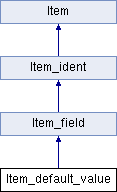|
My Project
|
|
My Project
|

Public Member Functions | |
| Item_default_value (Name_resolution_context *context_arg) | |
| Item_default_value (Name_resolution_context *context_arg, Item *a) | |
| enum Type | type () const |
| bool | eq (const Item *item, bool binary_cmp) const |
| bool | fix_fields (THD *, Item **) |
| virtual void | print (String *str, enum_query_type query_type) |
| type_conversion_status | save_in_field (Field *field_arg, bool no_conversions) |
| table_map | used_tables () const |
| Item * | get_tmp_table_item (THD *thd) |
| bool | walk (Item_processor processor, bool walk_subquery, uchar *args) |
| Item * | transform (Item_transformer transformer, uchar *args) |
Public Attributes | |
| Item * | arg |
| bool Item_default_value::eq | ( | const Item * | item, |
| bool | binary_cmp | ||
| ) | const [virtual] |
This function is called when:
Reimplemented from Item_field.
| bool Item_default_value::fix_fields | ( | THD * | thd, |
| Item ** | reference | ||
| ) | [virtual] |
Resolve the name of a column reference.
The method resolves the column reference represented by 'this' as a column present in one of: FROM clause, SELECT clause, GROUP BY clause of a query Q, or in outer queries that contain Q.
The name resolution algorithm used is (where [T_j] is an optional table name that qualifies the column name):
resolve_column_reference([T_j].col_ref_i)
{
search for a column or derived column named col_ref_i
[in table T_j] in the FROM clause of Q;
if such a column is NOT found AND // Lookup in outer queries.
there are outer queries
{
for each outer query Q_k beginning from the inner-most one
{
search for a column or derived column named col_ref_i
[in table T_j] in the FROM clause of Q_k;
if such a column is not found
Search for a column or derived column named col_ref_i
[in table T_j] in the SELECT and GROUP clauses of Q_k.
}
}
}
Notice that compared to Item_ref::fix_fields, here we first search the FROM clause, and then we search the SELECT and GROUP BY clauses.
| [in] | thd | current thread |
| [in,out] | reference | view column if this item was resolved to a view column |
| TRUE | if error |
| FALSE | on success |
Reimplemented from Item_field.
| void Item_default_value::print | ( | String * | str, |
| enum_query_type | query_type | ||
| ) | [virtual] |
This method is used for to:
For more information about view definition query, INFORMATION_SCHEMA query and why they should be generated from the Item-tree,
Reimplemented from Item_field.
| type_conversion_status Item_default_value::save_in_field | ( | Field * | field, |
| bool | no_conversions | ||
| ) | [virtual] |
Save a temporal value in packed longlong format into a Field. Used in optimizer.
| OUT | field The field to set the value to. |
| 0 | On success. |
| >0 | In error. |
Reimplemented from Item_field.
| Item * Item_default_value::transform | ( | Item_transformer | transformer, |
| uchar * | args | ||
| ) | [virtual] |
This method like the walk method traverses the item tree, but at the same time it can replace some nodes in the tree.
Reimplemented from Item.
 1.7.6.1
1.7.6.1